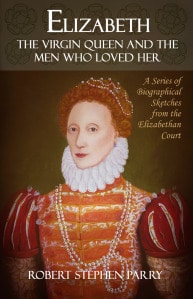 Thank you Claire for inviting me to your webpage today to say a few words about my most recent publication: Elizabeth – The Virgin Queen and the Men who Loved Her.
Thank you Claire for inviting me to your webpage today to say a few words about my most recent publication: Elizabeth – The Virgin Queen and the Men who Loved Her.
In the UK we have a popular advertising slogan concerning a well-known brand of varnish and which runs something like: “It does exactly what it says on the tin.” It’s a blunt, no-nonsense message which has grown into popular parlance as a way of describing something genuine – with no hidden extras or nasty surprises. Politicians use it; journalists use it, and so on. At the risk of trivialising the subject and also of being terribly uncontroversial, I feel that the image we have of Elizabeth Tudor, one of my abiding heroines of history, is rather similar. I do not, for example, think she was a man in disguise or a hermaphrodite; I do not think she was a fairy changeling, or a covert murderess or even, as some would have it a vampire slayer. I suspect she was in truth rather similar to the blend of knowledge and legend that has come down to us in popular culture and which, shock horror! probably does encompass the reality of the situation pretty closely.
Elizabeth was a person of great intellect and intelligence, someone with a multitude of interests, responsibilities and duties. She was a moderate person but she was compelled to operate in an immoderate world inherited from her father where in order to survive one had to adopt some unique and uncompromising characteristics. She wasn’t perfect, therefore. But there again she never claimed to be. A woman in a man’s world, imbued with a special sixth sense for danger, Elizabeth as Queen had to face some pretty tough decisions in her time, and so she surrounded herself with men who were loyal and clever but who were also expected to assume a lot of the responsibilities (and blame when things went wrong). These men, though they might indulge in ardent protestations of love to their queen were, by and large, also expected to keep their distance. That was how the court of Elizabeth functioned – an elaborate hierarchy of rivalry, courtly romance and poetic metaphor surrounding a tough and durable centre.
But what about the ‘virgin’ aspect? This is the part of the legend that some find the most difficult to accept in our own times. But should we? It is often easy to forget that in the 16th Century it was not considered unnatural or in any sense wasteful or ‘weird’ for people to abstain from sexual activity – and that many people throughout all of Europe, and even in England prior to the Reformation, quite happily chose lives of celibacy within holy orders, monasteries and cloisters. I have used a combination of fact and fiction in my book to try to demonstrate this situation, and I will be happy if the reader comes away with the feeling that it was totally plausible, therefore, that Elizabeth was exactly as described by the legend and by history, a Virgin Queen – or, as her faithful companion, confidante and servant for over 50 years, Blanche Parry once declared and had carved into her monument, which can still be seen at Bacton Church in Herefordshire: “With maiden Queen a maid did end my life.”
The truth, they say, is often stranger than fiction. It can be perplexing at times. It can be most peculiar at others, especially to our eyes at a remove of more than four centuries. But in Elizabeth’s case it is probably the unvarnished truth, for all that.
Elizabeth: The Virgin Queen and the Men Who Loved Her by Robert Stephen Parry
Robert’s book on Elizabeth I was released in June 2014 and you can read my review of it and find out more information about it at Tudor Book Reviews – click here.